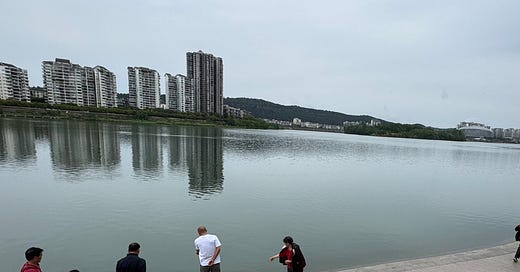感生4. Death songs
I spent a week with older people in my family in Chengdu and was surprised by how often they talked about death.
“Seventy-five to eighty-five is the best time to go,” my nainai (paternal grandma) said. “That way you don’t have this illness or that illness. No one needs to be responsible for you. No pain.” She had picked that up from some short video online.
“Small sickness you treat yourself. Big sickness you end yourself,” my laolao (maternal grandma) said while walking cheerfully. She had taken care of my grandfather for more than a decade. Three years in the ICU, ten years bedridden before that. She knew what big sickness meant. My grandpa used to sing about little grasses while he lay there, unable to move, saying, “I’m dragging you down. I’ve wasted your time.” I could understand why she didn’t want to be bedridden.
There was my second uncle, who said that when he died, he didn’t want a grave, didn’t want his ashes kept, didn’t want his kids to sweep tombs. “Why would I force them to follow my beliefs after I’m gone? They might be busy working in another city, I cannot force them to come back to my grave.” He added that “We live 200 years. 100 physically, 100 in our children and grandchildren’s hearts. Keeping the passed ones in our hearts is the most important place. As we sat there around the hotpot, he started crying. “I still think about my father all the time,” he said. “I still remember him.” I felt confused why he no longer follows ancestor worship traditions that I assumed is so common in the Buddhist-Daoist culture. I wonder if there is a historical gap.
We visited his mother who is 92 years old in the hospital. There were three beds to a room in the senior section. Most of the elders lay with mouths slightly open, some with tubes in their noses, knit hats covering their heads. The complications chart on the wall each had checkmarks: diabetes, cardiovascular disease, gallstones. She held my nainai’s hand and rubbed her eye with her other hand. She became blind in that eye. “I can’t see. I can’t hear. I want to go, but I can’t,” she kept saying. My grandma didn’t really understand her Sichuan dialect, just tried to comfort her in her Changzhounese, half to comfort her own anxiety about indignant slow death.
After we left the hospital room, my uncle said lightly: “Once you’ve seen the old people’s ward, you think more clearly. Life is for playing.”
Later, I was in a somatics class. The teacher said to let the pelvis guide the body like it’s a child: gently, encouraging it to go somewhere new. I was following along, then I drifted into memory.
I began mimicking that elder in the hospital, the way she rubbed her blind eye back and forth. And then, in that moment, I imagined my grandma, lying next to me. Maybe sad from how I’ve been shouting at her because of her hard of hearing. I hugged her in my imagination. Slowly. I imagined someone bigger than both of us wrapping us in a giant warm blanket, holding us. And I started to cry.
I don’t know if I was distracted from the meditation or if that was the meditation. But I felt relief, like I had finally let the contradiction exist.

When I told this to my friend Tonglen, they said it reminds them of the Zhuang tribe song, “Old People Don’t Worry”.
The song was recorded in Qingshuijiang, a village by the river. Qian Zhanglan sang it with her friend. They were in their 60s, sitting under a tree with a group of other elders. When asked about the song, she said she learned it from the old people when she was a girl, while herding cows. She invented her own lyrics later when she moved to her husband’s village. She sings it when she misses her mother.
The lyrics go:
Old people don’t worry
There is still joy
When you die, you become a bird
You fly above the earth
And see everything.
Before I was confused why older people in my family see death in this way that feels distant from spiritualities and cultures closer to nature. For now, I think both are seeing ourselves in the ecology of death, we like animals will die. We like animals want to live and play in this living, dying world.
I see my family face death anxiety by walking in the park. My nainai finds wild greens to stuff into dumplings, and nudges me to dance with the old ladies, who made me nervous and warm. My laolao grows broken philohedron in old plastic buckets rescued from trash piles, and ate flowers from the tree mixed in soups during the famine. I love all the park moments with them. Park is their make-do nature. Dying like plants, joy, pain, birth, food are part of living to them.






